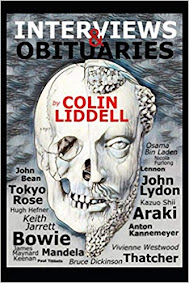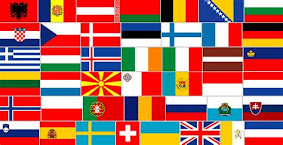by Modern-day Augustine
Self-proclaimed right-wing pagans and neo-pagans often claim that Christianity has been somehow developed as a secret weapon (the scheming culprits are usually said to be the Jews) to subdue the so-called "warrior spirit" of the European peoples.
As this notion is clearly gaining some traction, it warrants closer analysis. I hope to show that such a claim is ultimately specious, even if it may seem superficially compelling in certain respects.
First of all, one cannot help but observe that the right-wing neo-pagan’s overall approach to paganism is quite similar to that of the neoconservative’s attitude towards Christianity. In each case, faith is more often exploited than properly and respectfully adhered to.
Your average western neoconservative mover and shaker is far less interested in actual orthodoxy within Christianity (the fundamentals of the faith and the adherence of the community to them) and more interested in the ways he can make the Christian narrative serve as a basis for his specific political ideology. He’ll cherry-pick the bits he finds useful within any given denomination’s dogma or theology (normally the bits most conducive to milquetoast modernism), and then he’ll blow up the significance of those bits, in order to advance his narrative or engender the appropriate response in the citizenry to his desired societal mode of operation. In this sense Christianity, is reduced to a means to an end.
Through this process so called modern Christianity has, necessarily, been robbed of a great deal of its deeper truth and therefore also of its ultimate inherent ability to inspire. This same bowdlerized approach clearly underlies the commonly adopted neo-pagan narrative among some on the Dissident Right.
One need only look at the catalogue of supposed ills for which Christianity is said to be responsible, and then think of the implied opposites neo-paganism supposedly wishes to resurrect, in order to see this kind of fuzzy logic in operation.
For instance, it is often implied that Westerners have become weak to the point of enfeeblement because of the Christian emphasis on charity and love for one’s neighbour. If we just embraced our pagan roots and stopped being such lovey-dovey hippy-dippy wimps, they argue, we’d grow more robust and regain the power we once held.
Historically speaking, however, it is the Cross of Christ, and not some pagan collection of stones or burial mounds, that has repeatedly proven to be the standard around which the mightiest warriors of our race have gathered to vanquish every single one of the numerous and generally unrelenting hordes of foes our culture has ever faced. In fact, it is these same warlike tendencies that are highlighted by cultural Marxists who wish to portray Christianity as a violent and intolerant religion. Indeed, the Left has also been known to selectively point out just how peaceful and, above-all benign the pagans were in comparison to Christians. An all too familiar tale of peaceful pagan “flower-children” versus rabidly intolerant and terribly violent Christians is the result.
Secondly, one need only perform a perfunctory analysis of a good deal of the social mores of our so called “betters” within the ranks of our respective national and international elites in order to spot the rather obvious pagan tendencies of said elites. After all, it is not exactly a Christian worldview that motivates a good number of businessmen, politicians and other international movers and shakers to participate in the “cremation of care” ceremony at the foot of a giant owl statue in the woods outside San Francisco (Bohemian Grove, anyone?). Am I really the only right-winger who has noticed all the pagan symbols associated with the cult of the State that this elite is helping to foster?
*************
In fact, it is this very same elite, and therefore by extension its State apparatus, with which our movement is now locked in an apocalyptic, fundamental and existential struggle. I therefore argue that it is neo-paganism, NOT Christianity, which has always been the proverbial Trojan Horse within our encampment. In fact - fanciful notions produced by the decidedly feverish imaginations of late 20th and early 21st Century youths regarding the perceived virtues of paganism aside - the so called "neo-pagans" are possessed of a damn sight more potential to be co-opted by the Zeitgeist than traditional Christians ever could be.
After all, what would applied neo-paganism actually look like, if it were to become the default faith of the West?
First off, if one rejects the old mythologies, i.e. the actual basis of the traditions of which we speak, or if one simply begins to cherry-pick the “best bits,” then one inevitably must also attempt to fill in the resultant gaps with something of one’s own creation. I don’t know about you, but I am not exactly filled with enthusiasm when I contemplate the concept of anyone born in the last few centuries being tasked with the creation of a new pan-European religion. At best, the neo-pagan movement will simply end up re-inventing the wheel (i.e. one would either end up creating a religion based entirely on the deification of “supreme” humans or, much like the “green” liberal left, the deification of nature). At worst, it will very quickly devolve into a more superstitious and less inclusive form of all of the worst moral excesses born out of our post-modernist worldview (i.e. a kind of giant cluster-fuck with some mortal-combat, instead of football, mixed in for good measure).
Secondly, if one prefers to go down the resurrection route, then one need only look hard and objectively at the history and makeup of the phenomenon in question in order for its demerits to become readily apparent.
For, if the respective pantheons of the pagan traditions in question were possessed of Mars(Ares) and Minerva(Athene) or of Odin(Wodan), Modi and Tyr they were also home to Bacchus(Dionysus), Cupid(Eros) and Venus(Aphrodite), or Loki and Frigg.
Indeed, though the Roman legionary, the Greek hoplite, the Viking berserker and the Celtic naked fanatic were all formidable warriors and Aristotle, Archimedes, Virgil, and Gaius Plinius Secundus were all great thinkers, it must also be emphasized that (to name but a few examples) the Greco-Roman world institutionalised pederasty and normalised public ritual murder, indiscriminate slavery, human sacrifice (see: Druids, the pagans in the Baltic, Mycenaean Greece, etc.), and infanticide.
Traditions which celebrate --or even institutionalise-- the unquestionably poorer characteristics of man have no business being resurrected by men of our implied calibre. This is especially the case for the Right because, unlike our contemporary competitors, we are in fact duty bound to differentiate between what is good for our civilisation and what is therefore necessarily bad for it.
*************
Again, recall that it was our decidedly Christian forebears who built the civilisation neo-pagans are ultimately all so enamoured with. Modern-day Europeans are the descendants of the same people who flocked to the banners of Christ at Tours, at Roncesvalles, during the Crusades, at Liegnitz, Malta and Vienna. Our devoutly Christian ancestors were the ones who valorously and vigorously combated encroaching Islam, maintaining our territorial integrity and preserving our lands from invasion.
Allow me to make a rude inquiry. Take a moment and just try and imagine a large enough group of our fellows getting together to fight Islam under the banner of, let’s say, Grannus the river god. Is this really feasible? Of course not. Historically speaking, no pagan deity has inspired such fierce devotion among Westerners as Jesus Christ, the one whom Christians call the Son of God, King of Kings and Lord of Lords. More war-making, ass-kicking fervor has been inspired by the name of the Prince of Peace (crudely jeered at by some neo-pagans as “the kike on the spike”) than by any of his heathen antecedents. If the activities of previous centuries are any indication, the Christian faith is clearly no impediment to the West’s desire to survive and thrive. Our present malaise has other roots, unrelated to Christianity.
It is one of the easiest things in the world for an American or European male of a certain age and disposition to wax lyrical in praise of a world that he has no connection to and no experience of. It is romanticism at its finest, quite comparable to the sort of nonsense indulged in by liberals when dealing with any number of equally defunct and conquered tribes (see: Dances with Wolves). This manner of thinking is little more than know-nothing nostalgia born of ignorance, and it is high time we put it to rest.




























No comments:
Post a Comment
Your comment will appear after it has been checked for spam, trolling, and hate speech.